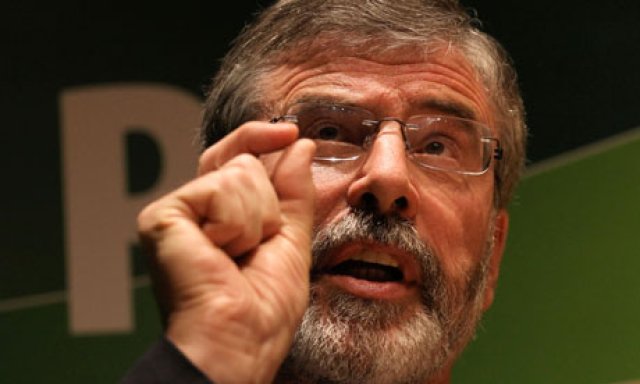
In a move denounced by Irish republicans as hypocritical and politically motived, Sinn Fein president and member of the Irish Dail (parliament) Gerry Adams was taken into custody by the Police Service of Northern Ireland (PSNI) on April 30.
He was questioned over the Irish Republican Army's 1972 killing of Belfast woman Jean McConville.
McConville was abducted, killed and secretly buried by the IRA, which alleged she was an informer, a claim later shown to be false. Adam has long denied being a member of the IRA, while emphasing he had supported the IRA's armed campaign against British occupation. He was linked to the McConville killing in recordings made by the Boston Oral History Project.
However, questions remain about the reliability of the claims. The project was initiated it by a former advisor to leading unionist (pro-British) politician David Trimble. The recordings featured “dissident” republicans opposed to Adams and to the peace process supported by Sinn Fein.
For his part, Adams told the PSNI back in March that he was available for questioning over the McConville case. However, the PSNI failed to act until the lead-up to the May 23 elections for European parliament in the Irish republic in the south and the British-controlled six counties that make up Northern Ireland, and local elections in the Irish republic. Polls show Sinn Fein set to make big gains.
Adams has denied any role in the killing, which he strong denounced. Adams said: “I believe that the killing of Jean McConville and the secret burial of her body was wrong and a grievous injustice to her and her family.”
The Sinn Fein leader said: “While I have concerns about the timing, I am voluntarily meeting with the PSNI … As a republican leader I have never shirked my responsibility to build the peace. This includes dealing with the difficult issue of victims and their families.”
Sinn Fein has proposed an international-led independent truth recovery process for all victims of the violence during “the Troubles” in Ireland's north in recent decades.
In the absence of such a mechanism, it supports implementing compromise proposals to deal with the past, put forward by Dr Richard Haass, which have been opposed or blocked by Britain and unionist parties.
Sinn Fein leaders have described the arrest as politically motivated and a bid to undermine the party's election campaign.
Standing on a platform of opposing the brutal austerity implemented by Ireland's government at the behest of the International Monetary Fund, European Central Bank and European Union “troika”, Sinn Fein is enjoying record-high polls.
The Irish Republican News said on May 1 that a recent poll found Sinn Fein was on the brink of becoming the largest party in both parts of Ireland in the elections. The Belfast Telegraph reported on April 21 that a poll found Adams was the most popular political leader in Ireland's south, with an approval rating of 48%.
Sinn Fein, which shares power in Ireland's north as part of the peace process, also opposed the spending cuts imposed on the six counties by the British government, which still controls its budget.
The arrest has also been criticised as hypocritical, given the well-documented crimes committed by British forces in Ireland during the Troubles, including active collaboration with pro-British loyalist paramilitaries.
Sinn Fein MLA and deputy first minister of Northern Ireland Martin McGuinness said on May 1 that there was no consistency on the part of the British state on the issue of state killings.
“The PSNI is duty bound to fully and energetically pursue all and every investigation and I support and encourage them to do so,” said McGuinness. “But I know that some investigations are pursued more vigorously than others.
“The families of the 11 innocent victims murdered in cold blood by the Parachute Regiment in Ballymurphy [in west Belfast in 1971], the victims of Bloody Sunday and those killed in the Dublin/Monaghan bombings which the British government are still withholding information on to this day are testament to this reality.
“Only this week the British government told the Ballymurphy families there would be no review of those murders. No reinvestigation, no arrests, no compassion for their loss or grief and certainly no political consistency from the British state.
“British forces are protected and immune. That’s why the British government has not signed up to the Haass proposals.”
Sinn Fein vice-president Mary Lou McDonald speaks to the press about Gerry Adams' arrest, which she says is politcally motivated. McDonald will be touring Australia in September to support Sinn Fein's "Uniting Ireland" campaign.
Thousands of people join a huge rally and mural launch in support of Sinn Féin President Gerry Adams TD and against his continuing detention.
Martin McGuinness explains his argument arguing that Gerry Adams' arrest is politically motivated.